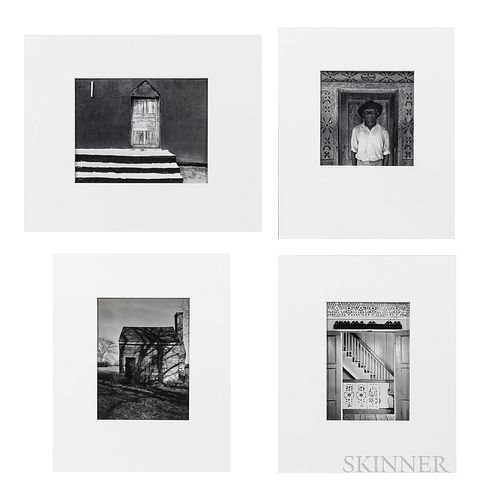Max Belcher (American, b. 1944) Four Silver Gelatin Prints from the Americo-Liberian Series and a Book
Lot 1053
About Seller
Bonhams Skinner
274 Cedar Hill Street
Marlborough, MA 01752
United States
Founded over four decades ago, Bonhams Skinner offers more than 60 auctions annually. Bonhams Skinner auctions reach an international audience and showcase the unique, rare, and beautiful in dozens of categories, including the fine and decorative arts, jewelry, modern design, musical instruments, sc...Read more
About Auction
Catalog Only
By Bonhams Skinner
Jul 22, 2021 - Aug 3, 2021
Set Reminder
2021-07-22 19:00:00
2021-08-03 19:00:00
America/New_York
Bidsquare
Bidsquare : Art. Action. Auction.
https://www.bidsquare.com/auctions/skinner/art-action-auction-7260
Skinner is honored to host “Art. Action. Auction.,” a no buyer’s premium sale held to support Boston-based Artists For Humanity, celebrating their 30th anniversary of challenging convention and making a bold and equitable impact in the artistic world for under-resourced, young, working artists. Bonhams Skinner bidsquare@bonhamsskinner.com
Skinner is honored to host “Art. Action. Auction.,” a no buyer’s premium sale held to support Boston-based Artists For Humanity, celebrating their 30th anniversary of challenging convention and making a bold and equitable impact in the artistic world for under-resourced, young, working artists. Bonhams Skinner bidsquare@bonhamsskinner.com
- Lot Description
Max Belcher (American, b. 1944)
Four Silver Gelatin Prints from the Americo-Liberian Series and a Book, images include: Mt. Zion Baptist Church, Royesville, Liberia, 1977, image size 7 1/2 x 9 1/2; Burgwyn Quarter, Jackson, NC, 1986, image size 9 1/4 x 7; Padmore House, Crozierville, Liberia, 1983, image size 9 1/4 x 6 1/2; and Solomon Eli Martin, Royesville, Liberia, 1977, image size 7 1/2 x 7 1/2 in.; all signed, dated, titled, and inscribed on the reverse, matted to 17 x 14 in.; accompanied by the book A Land and Life Remembered, Americo-Liberian Folk Architecture, in which the four prints are illustrated.
Donated by Elizabeth Haff, Old Masters & 19th Century Specialist in Skinner's American & European Works of Art department.
Note: Max Belcher was born in Philadelphia in 1944 to an African American father from North Carolina and a Jewish American mother of Polish/Lithuanian descent, born in rural Pennsylvania. In 1952 his father went to the Gold Coast at the invitation of the couple's wartime friend, Kwame Nkrumah, for what was meant to be an eight-week business trip. His father was to remain in Africa for the next four decades. By 1954, Belcher, Sr. had established himself in neighboring Liberia and had become a naturalized Liberian citizen; Max and his mother and sister then joined him.
At sixteen, Max Belcher began working in broadcasting as a staff announcer for the Liberian Broadcasting Corporation. By the time he left to go to school in the U.S. in 1964, his lived experience in Liberia, French Guinea and Sierra Leone, combined with his growing appreciation of the capacity of radio, television and film to inform and influence, made him aware of the need for the material and techniques required to disseminate practical information in a developing country, particularly on matters of public health, agricultural practice, child rearing, and road safety.
Belcher's plans were quickly thwarted by the escalation of the Vietnam War. Feeling that the draft was inevitable, Belcher enlisted in the U.S. Marines, serving as a radio and television broadcaster in the U.S. and at Armed Forces Radio and Television Service on Okinawa; and as a Marine Corps Combat Correspondent in Vietnam. After his tour of duty he settled in New York City, where he took a full-time job as a production assistant at NBC News and enrolled in college. He began his studies at Columbia University in 1968 but quickly transferred to the New School for Social Research, where a filmmaking instructor encouraged him to grow accustomed to seeing the world through the lens of a still camera. That training, initially intended to develop his skills as a filmmaker, introduced Belcher to the expressive potential of photography.
Continuing his liberal arts studies at the New School, he also enrolled in a photography class at the School of Visual Arts. At the same time he began shooting experimental photographs in and around New York City, often choosing friends, landscapes and local architecture as his subjects. Finishing his studies in 1970, he returned to Liberia in 1971, embarking on what would become his first major project as a professional photographer.
Since that time, Belcher's photographic interests in portraiture and vernacular architecture have developed in conjunction with the thematic exploration of racial identity, emigration and history that run through his work in Africa, Asia, North America, the Middle East, and the Caribbean. He has had numerous one-man shows in the eastern United States and has contributed to group exhibits group exhibits across the U.S. and in Canada, Italy, Chile, Vietnam, and Soviet Armenia. Belcher's photography is held both by private collectors and in the permanent collections of galleries and museums in the United States, Canada, and Vietnam. He has received major support from the National Endowment for the Humanities, Fulbright Scholars Program, the LEF Foundation, Massachusetts Cultural Council, the Kenan Charitable Trust, and programs of the National Endowment for the Arts. His publications include House and Home: Spirits of the South (1994), and A Land and Life Remembered: Americo-Liberian Folk Architecture (1988), both held by the David M. Rubenstein Rare Book & Manuscript Library. He has also taught black-and-white photography to beginning, intermediate and advanced students in Massachusetts, and has lectured on his work. He currently resides in Cambridge, Massachusetts, with his wife. (https://archives.lib.duke.edu/catalog/belcher)Condition
Any condition statement is given as a courtesy to a client, is only an opinion and should not be treated as a statement of fact. Skinner Inc. shall have no responsibility for any error or omission. The absence of a condition statement does not imply that the lot is in perfect condition or completely free from wear and tear, imperfections or the effects of aging. - Shipping Info
-
Please visit http://www.skinnerinc.com/services/payment-and-shipping/ for information regarding the collection of items purchased at auction.
-
- Buyer's Premium



 EUR
EUR CAD
CAD AUD
AUD GBP
GBP MXN
MXN HKD
HKD CNY
CNY MYR
MYR SEK
SEK SGD
SGD CHF
CHF THB
THB












